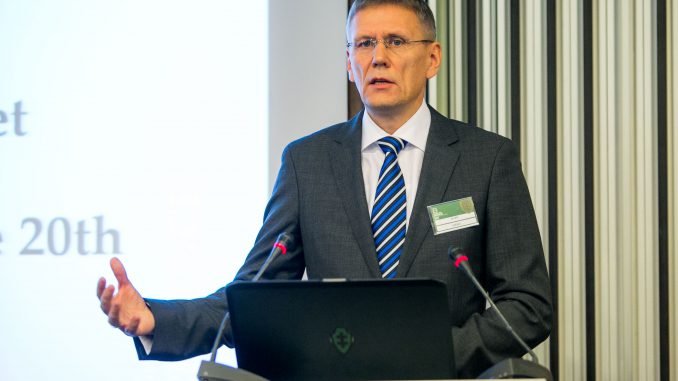
Speaking at an international conference of the Lithuanian Riflemen’s Union, he emphasized that Moscow underestimated the unity of the Western world amid its aggression in Ukraine.
“Misinformation campaigns erode over the time. Truth will win. Have no doubt,” he said at the event in the Lithuanian capital. Jaeski is deputy director of the NATO Centre of Excellence for Strategic Communication based in Riga, Latvia.
In his words, the Russian aggression in Ukraine mobilized and united NATO and the European Union (EU), as well as Ukrainians, thus undermining the Moscow reputation.
“Europe has become more united, NATO has become more united, Ukraine has become more united as a country,” said Jaeski.
The Estonian colonel said information campaigns may be successful in the short run, however, Moscow cannot control social media, furthermore, it turns out over time that the promises do not become reality – for instance, Crimea did not get the “heaven” it was promised.
In Jaeski’s words, Russian actions must be analysed in the light of the statement by Russian President Vladimir Putin that the breakup of the Soviet Union was the greatest geopolitical tragedy of the 20th century.
“All the actions that [Russia] has been taking are in order to fix ‘these mistakes’,” the colonel said at the conference Civil Defence in a Hybrid War.
In his words, using the information field is part of Russia’s military doctrine. In Ukraine, Russia has a few strategic narratives – Ukrainians allegedly aren’t an independent nation but a part of the Russian world currently governed by the Nazis, said Jaeski.
He said there are large numbers of evidence to prove presence of Russian troops in Ukraine, therefore, this can only be doubted by “fools or useful idiots.”
“Those useful idiots I believe should not work in our mainstream media because media task is not only to give news and entertainment but to safeguard our core values,” Jaeski stated.
In his speech, the colonel gave examples about the use of photographs from Bosnian and Chechen wars to lie about the war in Ukraine. Jaeski said the Russian information campaign is based on restricting independent media, hiring Internet commentators and acting against compatriot organizations.
“Compatriots abroad will be used as a tool to implement their home country’s ambitions,” Jaeski added.
Speaking at the conference of the Lithuanian Riflemen’s Union, British journalist and author Edward Lucas urged Lithuanians to prepare for threats but avoid panic.
He emphasized that Russia is not a strong country, adding it can be easily be defeated by a united Western world. In Lucas’ words, Putin is vulnerable, and the West should first of all arrest dirty Russian money.
On the other hand, the editor of the British daily The Economist said that the Kremlin will probably stick to its aggressive foreign policy, as the regime needs to mobilize the nation suffering from economic difficulties.
“In order to stay in power, he [Putin] needs to manufacture external threats,” said Lucas.

Be the first to comment